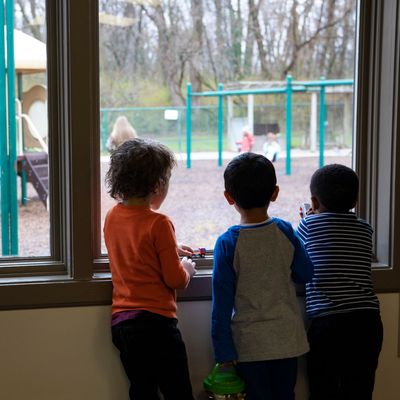
When the U.S. Census Bureau released its updated Supplemental Poverty Measure on Tuesday, it showed that child poverty more than doubled from 2021 to 2022. Record inflation was a major reason but perhaps not the largest. When Congress allowed the expanded Child Tax Credit to expire, that was “particularly damaging to child poverty,” according to the Economic Policy Institute.
More damage is coming. On September 30, expanded funding for child care provided by the American Rescue Plan Act will expire. Without swift intervention, 3.2 million children “could lose their child-care spots,” the Century Foundation reported in June. Some 70,000 child-care programs will probably close, leaving parents and children with fewer options for quality care. Parents will have to reduce their work hours or leave the workforce altogether, which will cost them about $9 billion in lost earnings, the report added.
The people we have elected could make different choices, and sometimes they have. Amid the death and grief inflicted by COVID, we glimpsed more humane possibilities. Stimulus payments helped keep families afloat, and the expanded Child Tax Credit drove a sharp reduction in child poverty. Child-care funding propped up a vital sector, keeping workers employed and children in care. But these measures were temporary, which might have prevented the formation of a constituency for them. Perhaps more meaningfully, they had powerful enemies. Senator Joe Manchin, a Democrat, reportedly believed parents would use Child Tax Credit payments on drugs. He later killed an attempt to extend the program, and children are suffering for it. Republicans, meanwhile, have nothing better to offer. They too oppose a permanent expansion of the Child Tax Credit.
Temporary pandemic programs left a fundamental truth unchanged: American children are in a state of emergency, and without intervention, it will become permanent. In order to salvage the future, lawmakers must change the present. To do so, many will have to reconsider their approach to the role of government in public life. There probably isn’t a way to bring down child-care costs and keep programs open without major federal investment, for example. Children need big government, and so do their parents. For the same reason, lawmakers who want to protect children from poverty should forget about “personal responsibility.” The notion is an obstacle to progress, as Manchin so usefully demonstrates. When he speculated about parental drug use, he simply assumed, as many do, that people in need must be feckless. This is a lie, and when we believe it, we inevitably punish children.
No child asks to be born. We do not sort them into households based on their individual merit. They are not responsible for the misdeeds of a parent — as if the mere fact of poverty were a misdeed at all. They should challenge lawmakers to think critically, and differently, about poverty and progress. Many say we should help only the families who will help themselves, as though the state is God and can discern the hearts of man. A new paradigm is necessary. All human beings have universal needs, and children are no exception. They require education, health care, and child care in addition to food and shelter. We can protect children by addressing those needs.
In doing so, we would naturally deal a blow to the right. Conservatives say they too want to protect children — so claims the parental-rights movement, at least. But as right-wing activists invent threats from the left, millions of children experience material harm just by being born in America. As long as it is conservative policy to block the expansion of the social safety net, the right will bear much of the blame. In the absence of progress, the right’s political project will flourish. Today’s failures will entrench certain race and class hierarchies in the future, and the United States will be even more deeply stratified than it is now. Only children born to wealth will enjoy the rights all children deserve. Everyone suffers when equality is hypothetical, but the most vulnerable among us will likely suffer the most. American children have no power — but we do. The future isn’t their responsibility but ours.






























